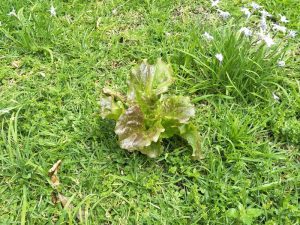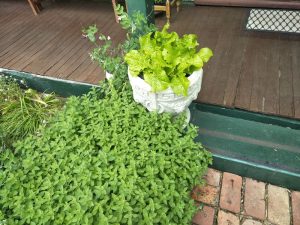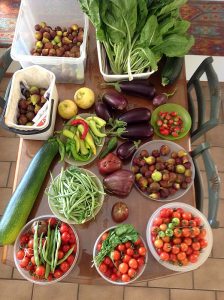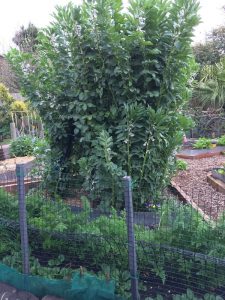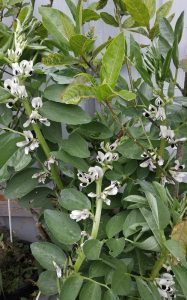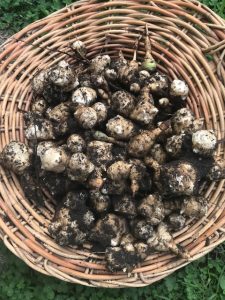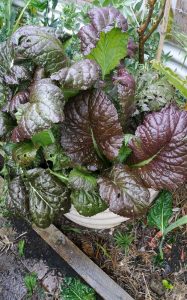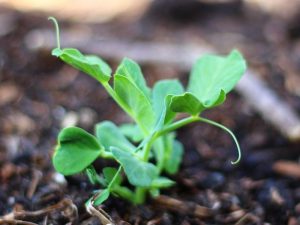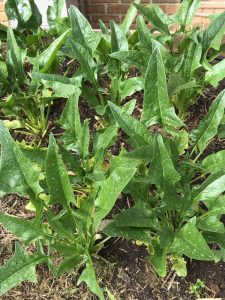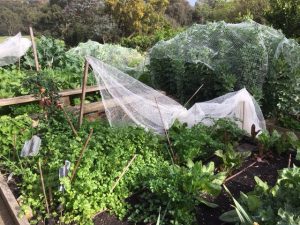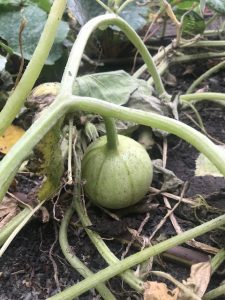Thanks to all the people who have contributed to this week’s newsletter: Annie Howard, Cathy Romeo, Choon Yin Yeok, Chris Kent, Claire Smith, Gabrielle Callahan, Helen Simpson, Jesse Argent, Jon Buttery, Meg Montague, Natalie Nigol, Penny Smith, Rebecca Haschek, Rita Varrasso, Soo Mei Leong, Valerie Mudie and Zofia Di Stefano.
This week’s farmers’ markets
Saturday: Collingwood Children’s Farm and Coburg.
Sunday: Alphington, Eltham and Whitehorse.
How to make homemade gin
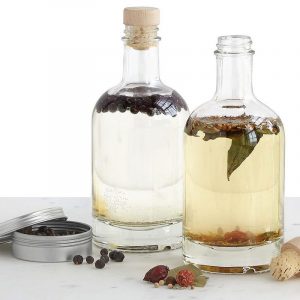 A few years ago, I (Guy) was lucky enough to attend a workshop at Sustainable Macleod where Gabrielle Callahan showed us how to make gin. It was a revelation: gin is really easy, really fun and really quick to make at home!
A few years ago, I (Guy) was lucky enough to attend a workshop at Sustainable Macleod where Gabrielle Callahan showed us how to make gin. It was a revelation: gin is really easy, really fun and really quick to make at home!
Most spirits are defined by the source of their alcohol. Brandy is made from fermented grapes. Rum is made from fermented sugarcane. Whisky is made from fermented grain. Vodka is made from fermented potatoes (or fermented grain). But gin is an exception because it can be made with any neutral spirit. Whilst commercial gin makers usually use spirit bought from industrial ethanol factories, home gin makers usually use vodka.
Rather than the alcohol, the thing that defines gin is the presence of juniper berries.
Nowadays, all gins contain ‘botanicals’ to give them flavour but basically any seed, berry, root, fruit or herb can count as a ‘botanical’. In concept, therefore, you can add just about whatever you want to give the 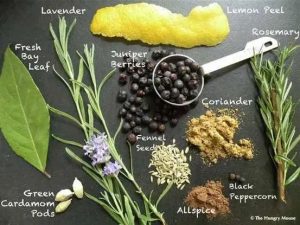 gin flavour.
gin flavour.
Finally, whilst commercial gins are usually made by distillation, homemade gin is simply made by adding the ingredients together and waiting.
So, the recipe for gin is really simple. Ingredients: vodka, juniper berries and ‘botanicals’. Method: mix all the ingredients together and, after a few days, sieve.
And the fun part of making gin is that you can experiment with different botanicals and thus different flavours. Every bottle that you make will taste a bit different.
The two most commonly used botanicals are coriander seed and citrus peel (e.g. lemon or orange). Other often used botanicals include cardamom pods, nutmeg, angelica root and orris root. Wikipedia also lists anise, liquorice root, cinnamon, almond, cubeb, savory, dragon eye (longan), saffron, baobab, frankincense, coriander, grains of paradise and cassia bark as possibilities. Or, if you have them, you could include lavender, chamomile, rose, rosemary or sage.
Example ingredients
a bottle of vodka
30 grams (2 tablespoons) juniper berries
5 grams (1 teaspoon) coriander seed
1 strip of citrus peel, either fresh or dried
other botanicals to taste
Method
Mix all the ingredients together, except any fresh citrus peel, in a clean sterile bottle and leave for 24 hours.
Taste, add more botanicals if desired, add any fresh citrus peel, and leave for another 24 hours.
Taste and, if you want a stronger taste, leave for another 24 hours, shaking at least once.
Use a sieve to filter out the botanicals and leave for another 48 hours.
Don’t worry that if the gin is not as clear as commercial gin (that’s why they distil) but, if you feel the need, filter out any remaining sediment.
Drink!
You can find a slightly longer version of this article on our website.
Jon’s podcast of the week
Just before interstate travel became an exotic thing, Deryn from Western Australia visited Tassie for this podcast about the garlic festival in the tiny Koonya in Tassie.
Another free food pantry – JJ’s Community Support
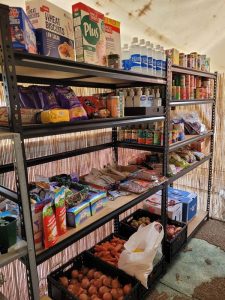 JJ’s Community Support, in Reservoir, is about helping create community spirit, supporting one another and being a central place to come to for support. It includes a ‘community table’, which typically has a variety of food, health and hygiene products which anyone in need is free to take, and which is accessible 7 days a week, 9am-7pm. The food available usually includes fruit, vegetables and pantry products. There is also a fridge and freezer for storing frozen meals. The community table relies on the donations and support from community members and businesses. Welcome Jesse!
JJ’s Community Support, in Reservoir, is about helping create community spirit, supporting one another and being a central place to come to for support. It includes a ‘community table’, which typically has a variety of food, health and hygiene products which anyone in need is free to take, and which is accessible 7 days a week, 9am-7pm. The food available usually includes fruit, vegetables and pantry products. There is also a fridge and freezer for storing frozen meals. The community table relies on the donations and support from community members and businesses. Welcome Jesse!
Look at a map of where all the free community pantries are.
Yes, you did know!
Last week, Victoria Kanicki asked where and how she should plant bergamot, korean mint, valerian and calendula seeds. Two of you replied, both very helpfully.
Helen Simpson: “For the bergamot, mint and valerian, as the seed is small, start in small containers (away from snails, etc). When the seedlings grow to around 5–10cm tall, they can go into large pots or the garden. The calendula seed, being larger, can be planted directly into large pots or the garden (again protect from snails).“
Penny Smith: “For each of the seeds that they sell, The Seed Collection has a useful table with details of their growth method (you have to scroll and I assume that the method ‘raise seedlings’ means grow them in a punnet or pot first and then transplant). So: bergamot, korean mint, valerian and calendula.“
“I just germinated Korean perilla (Perilla frutescens) and that was a bit of a hassle: 3 days in the fridge in sand (I used succulent mix) followed by soaking overnight in warm water (how was I meant to keep the water warm all night?) and then germinate at 25degC on my heat mat. I wasn’t sure how deep to plant so I did half on top of the soil and half with a sprinkle covering it. A week later, only the seeds in the light have germinated. Green perilla (Perilla frutescens var. crispa) germinated outside with little care but purple perilla (which I assume is the same species or sub-species) didn’t. So the purple is now on the heat mat inside and I’ll see what happens.“
Yes, you did help!
 A couple of weeks ago, Annie Howard asked if anyone could sell her some young or laying hens. Now, courtesy of Pauline Crosby, her wish has been granted. Says, Annie: “I have become the proud owner of 2 black australorp hens – they are huge! It took a couple of days to introduce them to our remaining feathery bantam (see photo), but they now seem to be getting along well and laying eggs every day.“
A couple of weeks ago, Annie Howard asked if anyone could sell her some young or laying hens. Now, courtesy of Pauline Crosby, her wish has been granted. Says, Annie: “I have become the proud owner of 2 black australorp hens – they are huge! It took a couple of days to introduce them to our remaining feathery bantam (see photo), but they now seem to be getting along well and laying eggs every day.“
Do you know?
Valerie Mudie has just sown some seeds of a herb called strawberry spinach (Blitum capitatum syn. Chenopodium capitatum). Has anyone got any advice or her on how to grow it, when to harvest it, what parts are edible, etc? Email your responses.
Tomato and other veggie seedlings available at Kevin Heinze Grow (Coburg and Doncaster)
As discussed last week, Kevin Heinze Grow are currently selling their tomato and other veggie seedlings via a ‘call and collect’ service. You choose what you want from their website and send them an email (plantsales@kevinheinzegrow.org.au). They will then contact you re payment and to organise collection.
Guy’s tip of the week – mizuna and mustard greens
Some people like eating lettuce as their main leafy green. Others like something more peppery, such as rocket (aka arugula). I’d like to suggest that you try either/both mustard greens or mizuna. Both have a pleasant peppery taste which is a bit milder than rocket. Both grow easily and quickly, and you can start harvesting leaves within two months of planting. You can plant them at any time of year. The plants should be spaced around 30cm apart. They also grow well in pots.
Mustard greens comes in two main forms, one with thin frilly leaves and the other with wide flat leaves. I eat both but prefer the former, with ‘golden frills’ being my favourite. Mizuna comes in a single form, with leaves of a similar size to those of rocket. I tend to grow mizuna during the summer because I find that it bolts (i.e. goes to seed) more slowly than mustard greens and I grow mustard greens during the rest of the year because I slightly prefer the taste.
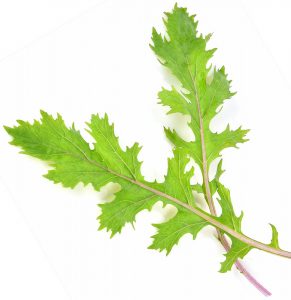 |
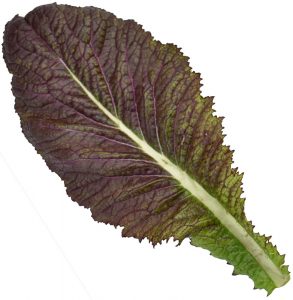 |
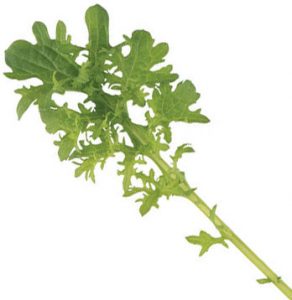 |
| Mizuna | Mustard greens red giant | Mustard greens golden frills |
Another beginner veggie – lettuce
Last week, I asked for suggestions on any veggies for beginners to grow. Meg Montague responded: “I love lettuce, because it readily self-seeds all over my garden – even in the lawn sometimes – and provides fresh leaves for garden salad lunches for months and months. I transplant tiny seedlings that pop up in the ‘wrong’ spots to the veggie garden and to the pots in the urns on my North facing front verandah – they have made a brave show this winter! See the lettuce next to my overgrown marjoram.“
Want a job?
At Farmer Incubator
Farmer Incubator is a Melbourne based not-for-profit organisation whose mission is to grow conscious farmers, empowering them with knowledge, experience, community and connection so that they can contribute to the regeneration of land and a sovereign food future. They are currently recruiting for two positions, namely General Manager and Human Resources Manager.
The General Manager role is the main executive role in the organisation and will report to the Board. The job is for 20-24 hours per week at $40 per hour over a 1 year contract. Read more and potentially apply.
The Human Resources Manager role will be responsible for all aspects of human resources and will report to the General Manager. The job is for 4-6 hours per week at $37 per hour over a 6 month contract. Read more and potentially apply.
At Melbourne Farmers’ Markets
Melbourne Farmers’ Markets operate a number of farmers’ markets around Melbourne, including at Alphington, Carlton and Coburg. They are currently recruiting for two positions, namely Market Manager at Alphington Farmers’ Market and market assistant roles at any/all of their markets, the latter being casual work. Read more and potentially apply.
Video of the week
Watch this 3 minute video by Sustain about their Melbourne Food Hub in Alphington.
Angelo’s article of the week
How to control snails and slugs without toxic chemicals.
Read more of Angelo’s articles about food growing.
Urban birds – an illustrated comic
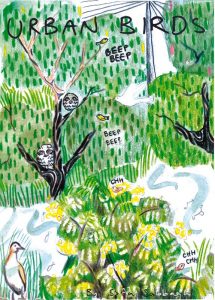 Newsletter reader Sofia Sabbagh has just published an 34 page A5 illustrated comic called Urban birds. A learning journey of bird life in Melbourne, with local stories and urban bird facts. $15 by pickup in Coburg or $19 posted. Read more and potentially buy.
Newsletter reader Sofia Sabbagh has just published an 34 page A5 illustrated comic called Urban birds. A learning journey of bird life in Melbourne, with local stories and urban bird facts. $15 by pickup in Coburg or $19 posted. Read more and potentially buy.
Panton Hill Vineyard & Winery is now famous!
As you presumably know, Leo recently bought a winery on Neighbours. What you might not know, however, is that the winery that he ‘bought’ is Panton Hill Vineyard & Winery. This is the same winery that Chloe and Pierce, also from Neighbours, got married at in 2019 – watch this behind-the-scenes video from the wedding.
The photo competition
The results of last week’s competition
The theme was ‘pictures from your veggie patch’ and attracted 11 entries. Thanks, everyone!
The winner, as judged by our panel, was Chris Kent’s smorgasbord.
A commendation to Zofia Di Stefano’s spinach, carrots and broad beans (look at the height of those broad beans).
This week’s competition
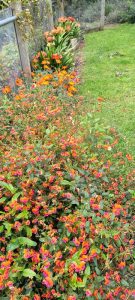 As we are still in lockdown, we are going to have another photo competition. The theme this week is ‘your garden (or someone elses garden)’. Email your photos together with some words about them.
As we are still in lockdown, we are going to have another photo competition. The theme this week is ‘your garden (or someone elses garden)’. Email your photos together with some words about them.
To get you started, the photo right is of a row of orange-flowering plants in my garden. From front to back, heart-leaf flame pea (chorizema cordatum), orange african daisy (arctotis x) and natal lily (clivia miniata). In summer, their flowers will be replaced by the equally orange red ice plant (malephora crocea) and lilium forever susan (lilium x).
I am beginning to run out of ideas for future photo competitions. If you have any suggestions, email me.
Which link was clicked most times in the last newsletter?
The most popular link last week was Robin’s article on how to grow potatoes.
Joke (or pun) of the week
A friend suggested putting horse manure on my strawberries. I’m never doing that again, I’m going back to whipped cream.
Upcoming online events – newly announced
If you know of an upcoming online event that you would like to see included in this newsletter, email me with either the details or a link to the details.
Marketing your product; Saturday, 9th October, 11am-1pm
Organised by Farmer Incubator. $40. Through discussions with farmers, buyers and facilitators who work in the industry, this event will be an exploration of the many ways for small scale producers to sell their produce. Read more and potentially book your place.
Cooking Indian by the creek; Saturday, 9th October, 5.30-6.30pm
Organised by Ritika Mahajan. $45. Chicken biryani and raita cook along session. Book your place using Facebook Messenger.
Business planning for food products; Tuesday, 12th October, 10-11.30am
Organised by Business of Food. $45. Starting small but planning for big means that you’ll experience fewer growing pains. Read more and potentially book your place.
Harvest work information session; Tuesday, 12th October, 7-7.45pm
Organised by Yarra Ranges Council. Free. Learn how you can apply for harvest jobs available in the Yarra Ranges over this Summer. Hear from a current harvest worker and a local cherry farmer.
Bush food for beginners; Wednesday, 13th October, 7.30-8.30pm
Organised by Open Gardens Victoria. $30. Topics will include: 6 of the best bush food plants for beginner gardeners; which plants to pot vs those to plant in the ground; basic growing information; harvesting; and uses for both fresh and dried plants. Presenter: Karen Sutherland. Read more and potentially book your place.
Harvest work information session; Thursday, 14th October, 12.30-1.15pm
Organised by Yarra Ranges Council. Free. Learn how you can apply for harvest jobs available in the Yarra Ranges over this Summer. Hear from a current harvest worker and a local cherry farmer.
Take your recipe to retail; Wednesday, 20th October, 9-10am
Organised by Business of Food. $50. Learn the practical steps to running a food business and understand the obligations of taking your food product to a retail market. Read more and potentially book your place.
Growing fruit and veggies in small spaces; Sunday, 24th October, 10.30am-midday
Organised by Bulleen Art and Garden. $35. Topics will include fruit, vegetables and berries for small spaces, growing produce in pots and containers, maximising productivity in any size space, and plant selection. Presenter: Angelo Eliades. Read more and potentially book your place.
Setting the right price for product; Tuesday, 26th October, 10-11.30am
Organised by Business of Food. $45. Learn about accurately costing your product and setting a retail price. Read more and potentially book your place.
Sustainability book chat; Tuesday, 26th October, 7.30-8.30pm
Organised by Sustainable Greensborough. Free. The book for this month is Call of the reed warbler: a new agriculture, a new earth by Charles Massy. Read more and potentially book your place.
Upcoming online events – previously announced
Wicking beds; Saturday, 9th October, 1-2.30pm
Organised by Sustainable Macleod. $15. Paul Gale-Baker will discuss the how and why of wicking beds, including a detailed explanation on how to put them together. Read more and potentially book your place.
Cook with Rosa; Saturday, 9th October, 2-4.30pm
Rosa’s traditional Italian cooking classes have moved online. $55. Menu: nonna concetta amaretti plus homemade tiramisu with homemade ladyfinger biscuits. Book by email (rosascookingclass@gmail.com).
Veggie gardening for beginners; Sunday, 10th October, 10.30am-midday
Organised by Bulleen Art and Garden. $35. This will cover all of the veggie gardening basics, from setting up your patch to harvesting. Presenter: Angelo Eliades. Read more and potentially book your place.
Gut health workshop; Tuesday, 12th October, 7-8pm
Organised by Whitehorse Manningham Libraries. Free. This workshop will cover practical dietary and lifestyle tips to nourish and support your gut microbiome, supporting good health, wellbeing and productivity. Presenter: Lindy from The Nutrition Guru. Read more and potentially book your place.
SecondBite’s mission is to end waste, end hunger; Thursday, 14th October, 1-2pm
Organised by Manningham Council. Presenter: Steve Clifford, CEO of SecondBite. Free. SecondBite rescues surplus food from retailers, manufacturers and farmers and re-distributes it free of charge to local charities and not-for-profits that run food programs. Read more and potentially book your place.
Beginners guide to pruning; Thursday, 14th October, 6-8pm
Organised by CERES. $50. Skill up in all the basics so you can get started pruning right away. Presenter: Carol Henderson. Read more and potentially book your place.
Growing great tomatoes; Saturday, 16th October, 10am-midday
Organised by CERES. $50. This workshop will cover: how to choose which tomato varieties to grow; whether to grow from seed or seedling, in pots, raised beds or directly into soil; when and how to plant and tips for success; training growth with stakes, cages or string vs free range; pros and cons of pruning; preventing common problems; feeding; and crop rotation. Presenter: Carol Henderson. Read more and potentially book your place.
Understanding and improving your soil; Sunday, 17th October, 10.30am-midday
Organised by Bulleen Art and Garden. $35. Learn how to identify the various types of soils and improve them to create a healthy and productive garden. Learn about the fundamentals of soil ecology, plant nutrition, soil pH management and soil care. Presenter: Angelo Eliades. Read more and potentially book your place.
Beginners guide to urban farming (7 sessions); starting Sunday, 17th October, 2pm
Organised by Richmond Community Learning Centre. $82 for all 7 sessions. The 7 sessions will cover: 1. making a wicking pot, starting seedlings, container gardening, introduction to permaculture; 2. soil, making biochar, trench composting, soil carbon, hugelkultur, soil food web, fungi; 3. composting, worm farming, bees wax wraps, weed tea; 4. straw bale gardens, hidden hugelkultur, no dig gardens, bee scaping, food scaping; 5. creating a guild, plant companions, polycultures, building soil, maximising space, increasing vigour and yield; 6. feeding the soil, organic control of common problems and pests, chop and drop, looking after our insect friends; and 7. seed saving, cuttings, produce sharing, seed sharing and making community connections. Read more and potentially book your place.
Composting at home; Saturday, 23rd October, 10-11am
Organised by Maroondah Council. Free. Learn how to set up, maintain and use a compost bin at home. Read more and potentially book your place.
Worm farming and Bokashi at home; Saturday, 23rd October, 11.30am-midday
Organised by Maroondah Council. Free. Learn how to set up, maintain and use a worm farm and Bokashi bucket. Read more and potentially book your place.
Home composting for beginners; Saturday, 23rd October, 2-3.30pm
Organised by Edendale Farm. Free. Learn the basics of home composting including how to set one up and maintain it, the simple recipe for success, what to add and what not to add. Read more and potentially book your place.
Preparing for a summer veggie crop; Wednesday, 27th October, 7-8.30pm
Organised by Boroondara Council. Free. You will learn about: garden maintenance and preparation; selecting what to plant and when to plant it; growing summer veggies in pots; managing hot weather, including mulching and smart watering; improving productivity sustainably, including crop rotation and companion planting; and soil preparation and management. Read more and potentially book your place.
Herbs for the kitchen garden; Thursday, 28th October, 6-8pm
Organised by CERES. $50. Learn the best herbs for sunny or shady spots, which grow well pots and what to grow when. Discover rules of thumb to know which herbs you can take cuttings from and which grow best from seed. Presenter: Carol Henderson. Read more and potentially book your place.
Otao Kitchen cooking classes; various dates
Otao Kitchen have moved many of their cooking classes online including chinese, dumpling making, indian, indonesian, japanese, korean, thai and vietnamese. Read more and potentially book your place.

